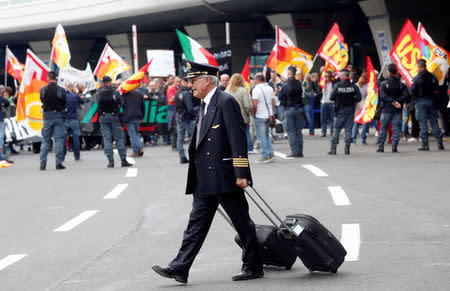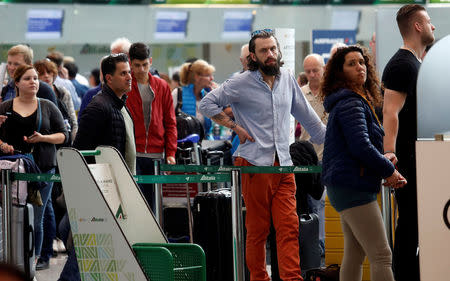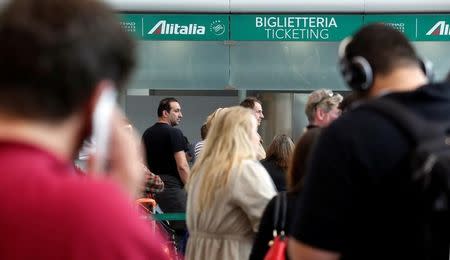Alitalia workers reject rescue plan, pressuring Rome to step in
By Alberto Sisto and Agnieszka Flak ROME/MILAN (Reuters) - Workers in loss-making Italian airline Alitalia rejected a management restructuring plan to cut jobs and salaries on Monday, betting that the government will be asked to call in an administrator to draft an alternative rescue plan. The flag carrier, owned 49 percent by Abu Dhabi-based Etihad Airways, has been bailed out repeatedly by Italian governments and private investors over the years, though Rome says it will not re-nationalise Alitalia and creditors are losing patience. "The workers' anger won out," said Antonio Piras, general secretary of the Fit-Cisl union, explaining why two-thirds of workers had rejected a plan that had been agreed with unions. The plan involved cutting 1,700 jobs among ground staff and trimming salaries among flight personnel by 8 percent in order to unlock additional financing and keep Alitalia in the air. It has made an annual profit only a few times in its 70-year history, is losing at least 500,000 euros (£424,831) a day and is set to run out of cash in coming weeks, sources say. Alitalia's board will hold a meeting on Tuesday. Sources say the company will use that meeting to consider whether to enter special administration, under which the government would be asked to appoint a commissioner to assess whether the carrier can be overhauled or should be wound up. With the firm under protection from creditors, the commissioner would seek to prepare industrial and financial plans for a rapid revamp of Alitalia, either as a standalone company or through a partial or total sale, or else put it on course for liquidation. Alitalia had warned that union backing was essential to obtain fresh funds from shareholders, which also include Italy's top two banks Intesa Sanpaolo and UniCredit . "This was a painful vote but a determined one against a company that until now has done little to fix its issues," several unions said in a joint statement, adding they hoped shareholders and the government would do everything possible to prevent decisions that could have traumatic consequences. Workers had repeatedly said they were unwilling to accept any further sacrifices when Alitalia's labour costs were already among the lowest among the legacy airlines in Europe. Before privatisation in 2009, various governments disbursed 4 billion euros in cash to Alitalia, rarely requiring strong industrial strategies in return. Prime Minister Paolo Gentiloni said over the weekend he understood the sacrifices workers had been asked to make but that Alitalia would not survive without the proposed cuts. Government ministers said in a joint statement that they were concerned about the outcome of the vote and would seek to minimise the impact on Italians and other travellers while Alitalia's shareholders decided what to do next. Alitalia said last month it would cut 1 billion euros in costs over three years and revamp its business model for short and medium-haul flights in order to return to profit by the end of 2019. The carrier also planned to increase flights on higher-margin long-haul routes, but workers remained skeptical over its plans, given a string of failed restructurings in the past. After buying into Alitalia in 2014, Etihad pledged to return it to profit by 2017 but the turnaround faltered in the face of competition from low-cost airlines and high-speed rail services. (Reporting by Alberto Sisto and Agnieszka Flak; Editing by Louise Ireland and Mark Bendeich)

 Yahoo Finance
Yahoo Finance 


